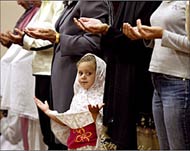Muslims pray in Berlin’s first mosque
The unmistakeable twin minarets, the domed roof and the marble staircase towards a heavy door, behind which the faithful kneel in midday prayers under the vaulted ceiling.

It could be Cairo, or Beirut or Damascus, or one of a thousand other cities and towns dotted across the Middle East and around the world. It is not.
This is Berlin, where the German capital’s first mosque has just opened and there are plans for a dozen more.
The city already boasts more than 70 places of prayer for Muslims, but not until the Pehitlik opened on Columbiadamm, a non-descript street in southern Berlin, has it had a mosque.
“It is good to have a representative place,” said Recep Turkogu, a member of the Turkish-Islamic Union for the Office of Religion (DITIB) which supervises 600 of the 2200 Muslim prayer centres in Germany.
Praying at home
There are some 3.4 million Muslims in Germany, including 220,000 in Berlin. An estimated two thirds are of Turkish origin.
Countrywide the Muslim community has 77 mosques. In Berlin, up to now, the prayers have been organised in apartments, halls and courtyards.
“We chose to stay in Germany,” said Recep, who moved here 34 years ago, “so we want convenient places to pray. We will show extremists the door.”
Old habits die hard for some, though. “Normally we pray in a flat,” said three Turks arriving for midday prayers at the Pehitlik mosque.
“Praying here is a chance to socialise, but we prefer to pray at our homes.”
The building on the Columbiadamm has excited little controversy, apart from a dispute over the size of the minarets.
Opposition
However, news of a dozen similar plans to build mosques or Islamic centres in Berlin, notably in the Turkish-dominated areas of Kreuzberg and Neukoelln, have raised concerns.
 |
|
The Muslim community in Germany |
“Generally, people think that, Islam being embedded in this district, it is legitimate that there are representative buildings,” said Guenther Piening, a Berlin city official responsible for matters of racial integration.
“But they fear mosques will encourage a radicalisation that
would threaten the liberal atmosphere of those districts.”
Another concern since the September 11, 2001 attacks is that some mosques could serve as recruiting centres for hardliners.
Neukoelln’s conservative mayor Heinz Buschkowsky said the best way to ease concerns was to ensure transparency, notably on how a project is financed, as well as ensuring the building fitted into the local environment.
Funding
Buschkowsky is battling against a plan by a little-known group, Inssan. It was set up two years ago and has only 40 members, yet has submitted proposals for what would be one of the biggest Islamic centres in Germany, complete with cafe, creche and library as well as a prayer room.
|
“We chose to stay in Germany, so we want convenient places to pray. We will show extremists the door” Recep Turkogu, a member of the Turkish-Islamic Union for the Office of Religion |
The mayor is concerned about Inssan’s credibility and source of funds, and says it was a mistake to grant it provisional planning permission.
But neither Piening nor Buschkowsky sees the spate of projects as a sign of any “re-awakening” of Islam, more a consequence of its growing naturalisation into German life, fuelled by competition between rival Islamic groups.
To oppose that trend, as some worried residents are doing in
places such as Kassel, central Germany, is “idiotic,” Buschkowsky said, “as if people wanted to go on a Christian crusade again.”